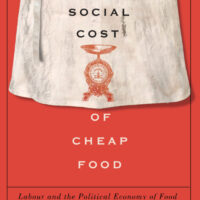
But is it food? The world of cheap produce and its consequences
Bee Wilson signe une belle recension du livre The Social Cost of Cheap Food (McGill-Queen’s University Press, 2019)de Sébastien Rioux dans le Times Literary Supplement.
« Cheap food, Rioux convincingly posits, is the answer to the question of how modern free market societies have succeeded in shoring up living standards for workers even in the face of stagnating wages. In a capitalist society, viewed from the point of view of consumers, cheap food looks like an unequivocal democratic good, because it enables people to feed themselves, even on relatively low incomes. Cheap food, Rioux explains, can counter-balance “the structural effects of pay cuts, temporary unemployment, and economic uncertainty”. The missing part of the picture, however, is that cheap food is also one of the factors pushing large swathes of the workforce into exploitation and poverty. Cheap food and cheap labour go hand in hand, and this is as true today in the US as it was in London in the 1880s, as Rioux discusses in his conclusion: « Out of the twenty occupations with the lowest median wages in 2012 [in the US], at least a third of them were directly related to food distribution, including cashiers; counter attendants in cafeterias, food concessions and coffee shops; cooks in fast food restaurants; hosts and hostesses; and waitresses and waiters. With an annual income of about $20,000 for full-time work, most of these workers are locked into poverty wages. » »



